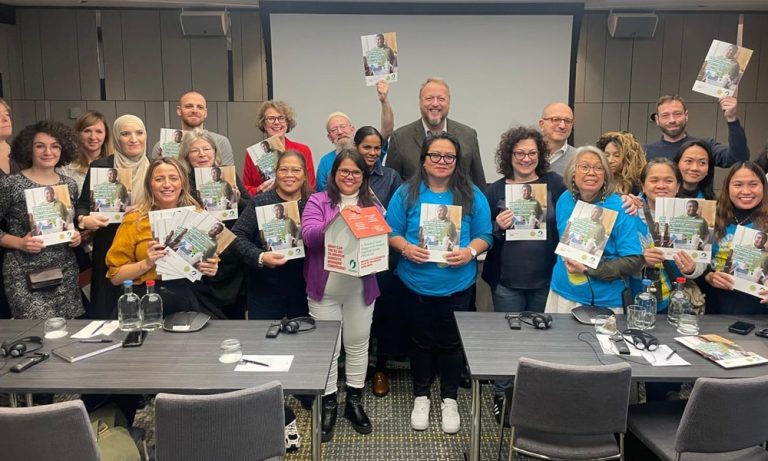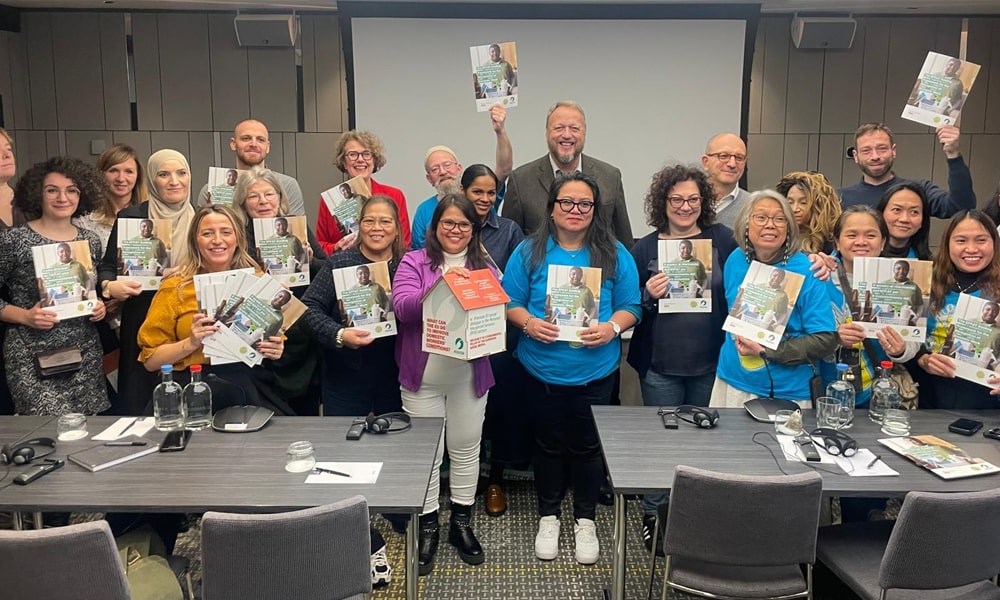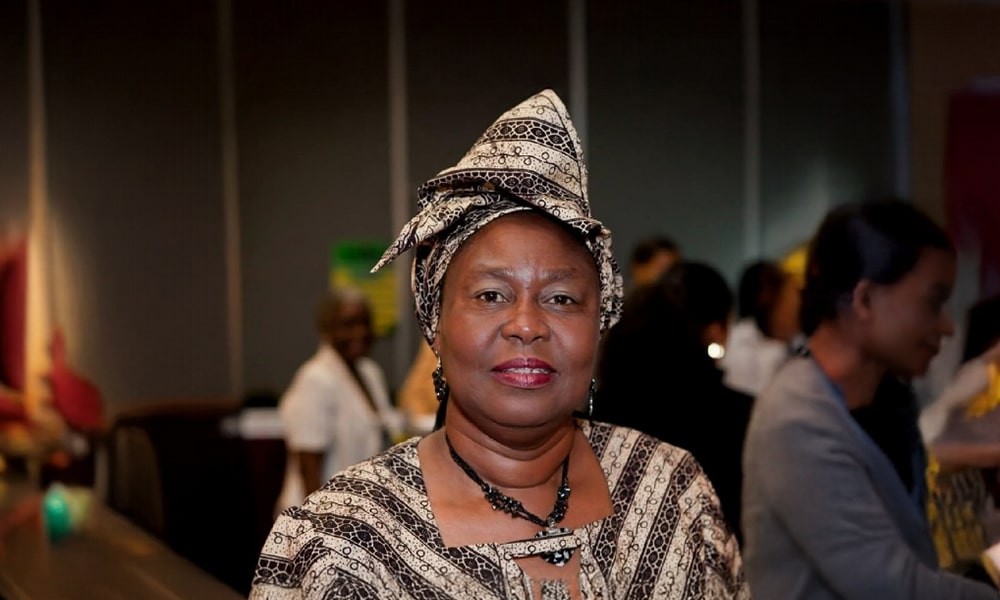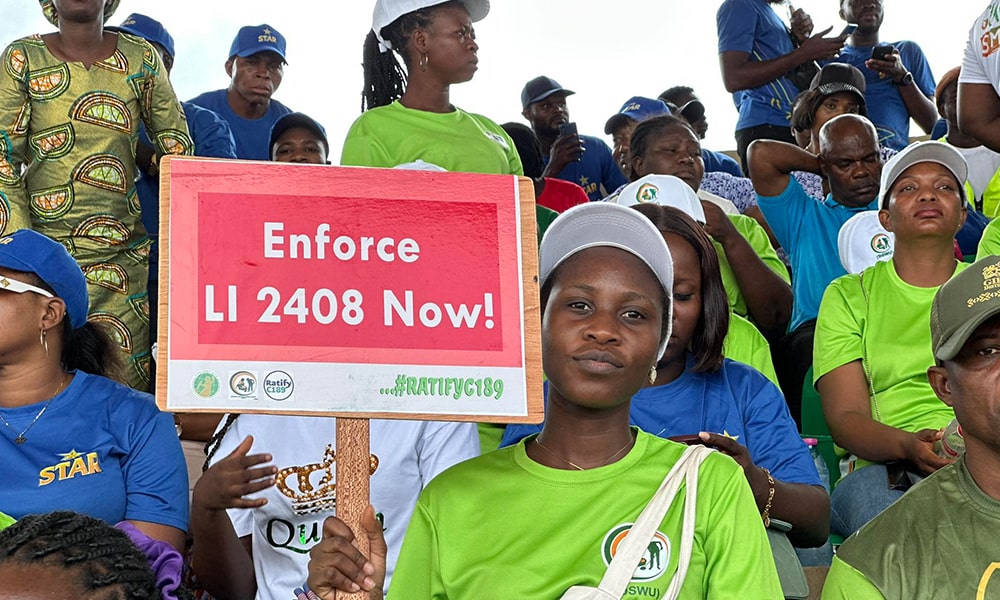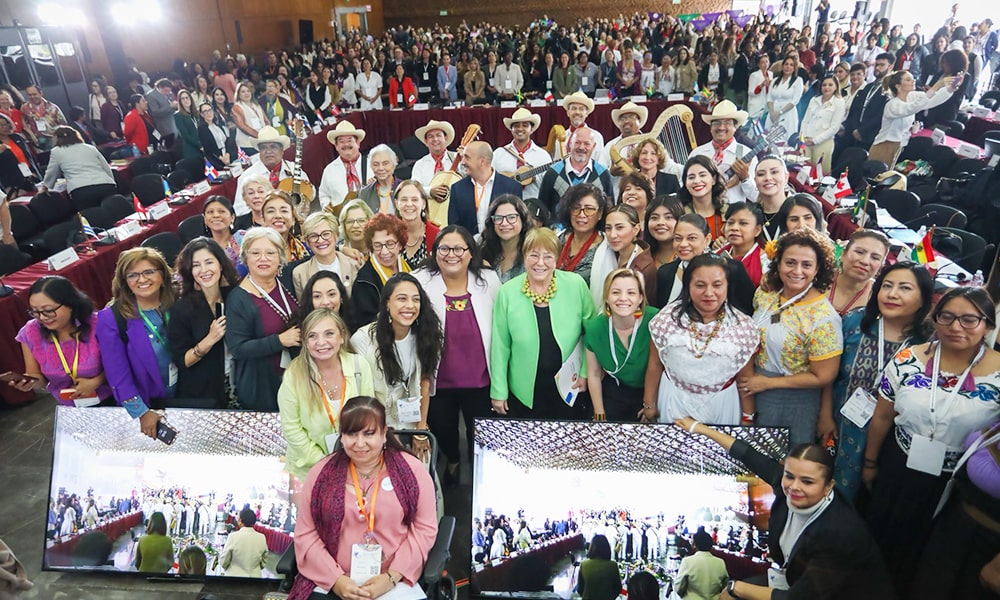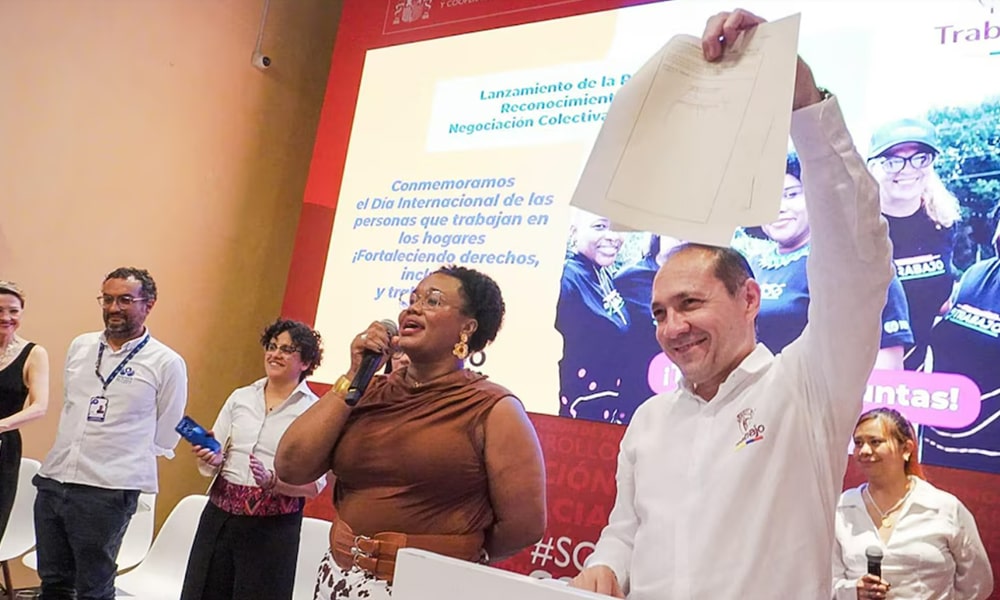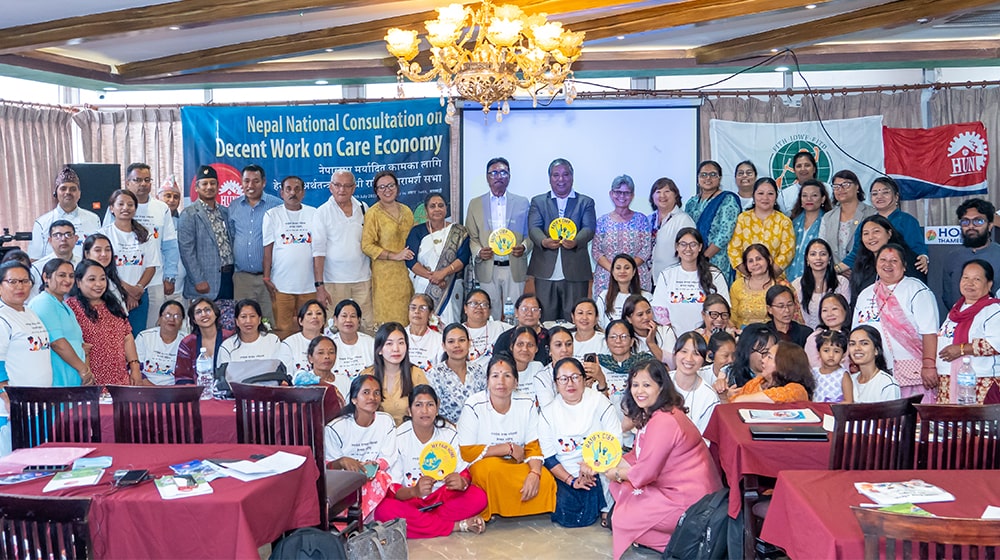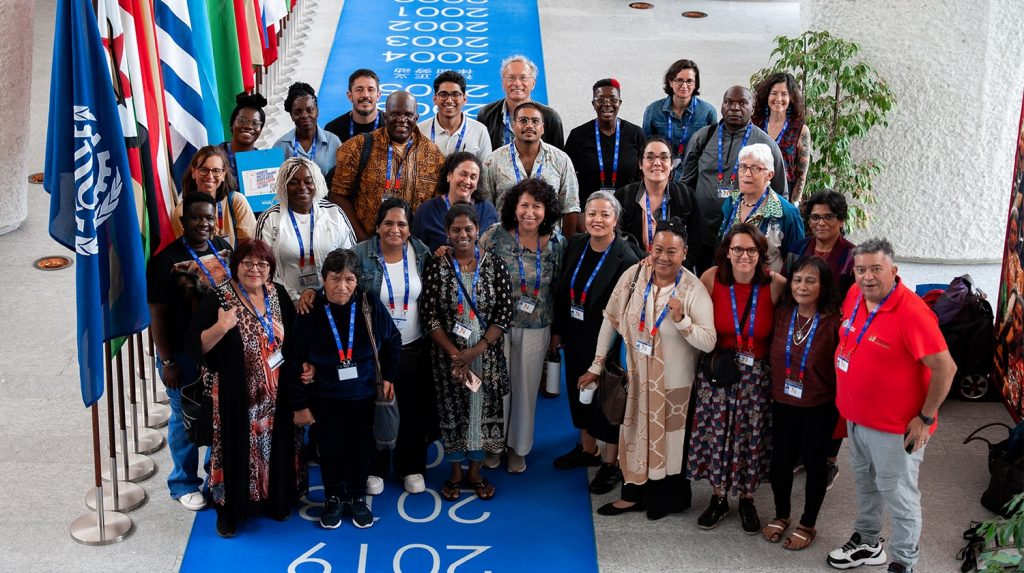
At the 113th Session of the International Labour Conference, workers had to push harder and stand more united than ever in a global tide that prioritizes productivity and profit over people. From June 2 to 13, the delegation of the International Domestic Workers Federation (IDWF) —together with allies from the WIEGO network and global unions—engaged in a tug-of-war with some governments and employers determined to promote flexibility, reduce liability, weaken labor protections, and deepen the structural erosion of workers’ rights across the world, serving the interests of the most powerful.
Yet we left Geneva with key victories in hand: the adoption of a groundbreaking new convention on biological hazards in the workplace; a promising resolution on addressing informality and promoting the transition to formality; and a global commitment to secure decent work in the platform economy. Just as importantly, we saw the ILO reaffirm—without hesitation—its essential role in advancing social justice, defending democracy, and tackling the major challenges workers face today, leaving no one behind.
A Win for Care and Migrant Workers in the Fight Against Informality
On the tenth anniversary of ILO Recommendation 204—the first international labor standard focused on the transition from the informal to the formal economy—the 2025 International Labour Conference placed a strong spotlight on its full implementation, tackling one of the most persistent challenges in the world of work: informality. Globally, around 60% of all workers are in informal employment, a figure that rises above 80% in domestic work. This means that at least 8 out of 10 domestic workers are unprotected and face poor working conditions that trap them in poverty.
In the General Discussion on informality, the IDWF was represented by Toindepi Dhure (Vice President), Sonia George (Executive Committee member representing Asia), Elaine Duncan (Executive Committee member representing the Caribbean), and Betty Tola (Regional Coordinator for Latin America). Our delegation, together with allies, helped shape the conclusions of the discussion, ensuring that domestic workers, care and support workers, and migrant workers were recognized as among the groups disproportionately affected by informality.
This discussion concluded with a relevant outcome: the adoption of a Resolution on addressing informality and promoting the transition to formality for decent work, which urges countries to implement national strategies for formalization and reflects several of the demands outlined in the IDWF’s position paper:
- Recognition of care and domestic workers, including migrant workers, as priority groups—requiring targeted approaches—in the transition to formality.
- Public financing to promote decent work, enabling decent livelihoods and fully formalized employment, including in the care and support sector, with access to universal, comprehensive, sustainable, effective, and adequate social protection.
- Correct classification of employment relationships.
- Gender-responsive policies and inclusion of ILO Convention 190 protections against violence and harassment for informal and precarious workers.
- Robust enforcement and compliance mechanisms.
- Improved policy coordination (economic, employment, social, and migration policies) and inclusive public services to support the transition to formality.
- Occupational safety and health protections for workers in informal employment.
- Exercise of the rights to freedom of association and collective bargaining / Organization, voice, and representation of workers in the informal economy, and inclusive social dialogue.
- Realization of the fundamental principles and rights at work.
This year, we succeeded in getting the need to combat informality in domestic work included in the global policy-making agenda. It is a major achievement—but not enough. Now, we must work hard to ensure that ILO Member States translate the resolution into action, starting with the ratification and effective implementation of Convention 189 as a key instrument for the formalization of domestic workers. C189 provides the strongest international legal framework for recognizing domestic work as formal work and as deserving the same protections as other employment sectors. The road to decent work for domestic workers must be one of full formalization!
A Decisive Step Toward Decent Work in the Platform Economy
The rise of digital labor platforms has pushed the ILO to seriously address the precarious conditions faced by over 150 million workers globally—including a growing number of domestic workers. These workers belong to various sectors already covered by ILO instruments, but because they are missclassified as independent contractors rather than workers in an employment relationship, most of them lack access to social security, legal protection, and job security, often enduring abusive working conditions. Migrant domestic workers are overrepresented in the platform economy and are among those most exposed to discrimination, violence and harassment, forced labor, and human trafficking.
In the Standard-setting Committee on Decent Work in the Platform Economy, the IDWF was represented by June Barrett (Second Vice President) and Fish Ip (Regional Coordinator for Asia), who brought attention to the serious risks and challenges affecting platform-based domestic workers. After long and tense negotiations, the Workers’ Group and a majority of governments backed an ILO Convention and Recommendation to secure decent work in the platform economy, which will be adopted during the 114th session of the Conference in 2026. The Resolution resulting from this discussion set the framework for next year’s negotiations on the scope and form of the instruments, definitions, and the recognition of workers’ and trade unions’ right to access algorithmic management information to ensure fairness, transparency, and accountability in platform work.
The IDWF is already developing a strong evidence-based position ahead of the platform economy negotiations at the ILC 2026, with a sharp focus on employment classification, legal protection and access to social security, fair remuneration, occupational safety and health, GBVH, collective bargaining, data protection and privacy, and protection of migrant workers. Domestic workers who perform their labor through digital platforms are not “platform workers” — they are still part of the domestic work sector and must be classified as such. They should also be protected under the umbrella of ILO Convention 189 and represented by domestic workers organizations. As our leader June Barrett said: “The future of labor cannot allow technology to erase fundamental worker rights.”
A Breakthrough for Workers’ Safety and Health
Another major achievement of this year’s ILC was the adoption of the first-ever international instruments aimed at protecting workers across all sectors from biological hazards in the workplace: Convention 192 and Recommendation 209. These standards establish strong provisions on prevention, inspection, whistleblower protections, access to health services, and compensation for occupational disease and injury. They also cover a broad range of biological hazards, acknowledge climate and environmental factors that exacerbate exposure, include a reference to self-employed workers, and identify migrant workers as one of the high-risk groups.
This new standard is expected to play a critical role in strengthening occupational safety and health, one of the fundamental principles and rights at work. Trade unions are already engaging in strong advocacy to push for its urgent ratification and effective implementation worldwide.
IDWF Side Event: Packed Room and Record-Breaking Online Audience
The launch event for the IDWF’s Theory of Change Report was a resounding success: 70 participants attended in person, and the Facebook livestream received around 1,300 views from approximately 700 users and 380 interactions. This is a clear sign of the growing mass support for the domestic workers movement and its demands.
Together with distinguished speakers and steadfast allies from the Government of Uruguay, the ILO, and global unions, we reflected on our movement’s struggles and victories and addressed the changes needed to advance decent work for domestic workers in the era of care—both in law and in practice.
Our movement is experiencing an unprecedented moment of visibility: the world is finally seeing the power we’ve built. And most importantly, we can see it too, and harness it to keep achieving our goals. Domestic workers have made the unthinkable possible—and now that we are fully aware of it, nothing can stop us.
Paving the Way for Change Beyond the ILC
The ILC provided a valuable opportunity for the IDWF to create spaces for social dialogue aimed at advancing domestic workers’ rights at the national level. We met with Guatemala’s Minister of Labor, Miriam Roquel, who pledged to support the activities of the recently established Multisectoral Committee for Domestic Workers’ Rights and emphasized the crucial role of domestic workers unions in this unprecedented initiative. We also held a meeting with Honduras’ Minister of Labor, Javier Fernández, who committed to promoting the ratification of Convention 189 in the National Congress. During our discussions with President Luis Abinader and Labor Minister Eddy Olivares of the Dominican Republic, we secured a commitment to foster the registration of domestic workers in the national social security system.
In addition, a delegation of allied organizations—including representatives from WIEGO, StreetNet, HomeNet, the International Alliance of Waste Pickers, and the IDWF—met with the Brazilian Minister of Labor, Luiz Marinho, and members of the Labor Commission of the National Congress to raise the challenges and demands of workers in informal employment in Brazil. We also held meetings with trade union federations from Honduras and Guatemala to strengthen alliances for the ratification of C189 in both countries. Finally, we had a key exchange with Amanda Villatoro, Director of the ILO’s Bureau for Workers’ Activities (ACTRAV), in which we discussed strategies to promote the prompt ratification of C189 in Honduras and Guatemala.
Taking a Stand for Peace, Democracy, and Freedom
Outside the ILO headquarters, the international labor movement took to the streets to show solidarity with the workers of Myanmar, Belarus, and Ukraine, whose rights and individual freedoms have been violently suppressed. The IDWF delegation stood firmly in these displays of collective power—because when human rights are under threat, the domestic workers movement does not stand idly by.
Inside the ILO building, Member States made two politically and symbolically significant decisions. Amid the humanitarian catastrophe in Gaza, the ILC adopted a resolution granting Palestine non-member observer status, strengthening the voice of Palestinian workers within the ILO system. The Conference also adopted a resolution on Myanmar, invoking Article 33 of the ILO Constitution against the country’s military junta. The document demands that the military authorities fully implement the recommendations of the ILO Commission of Inquiry—particularly those concerning freedom of association and the elimination of forced labor—and calls for greater international scrutiny and support to uphold the rights of Myanmar’s workers.
The 2025 International Labour Conference marked a pivotal moment for workers and trade unions, concluding with meaningful progress on critical issues shaping the future of work. But our fight doesn’t stop within the walls of the ILO. On June 14, the IDWF was already hard at work crafting strategies to ensure that the decisions made during the ILC don’t remain mere words on paper, but become tangible actions that transform the lives of domestic workers worldwide.

